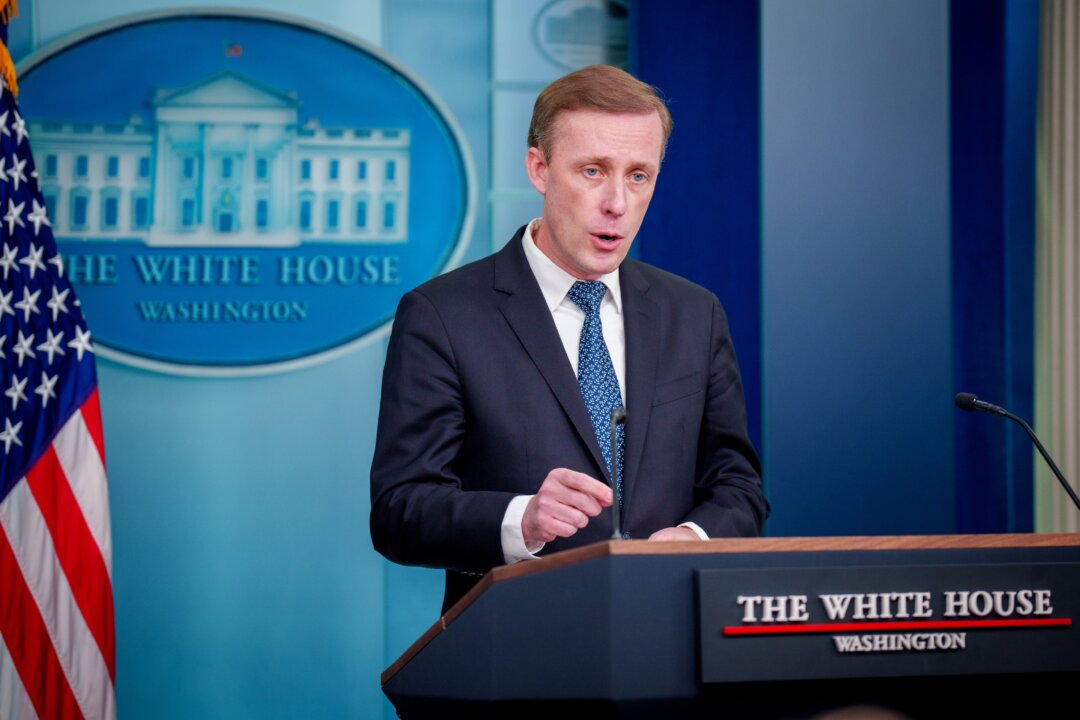The outgoing national security adviser said U.S. alliances have grown stronger as its adversaries weakened.
Outgoing National Security Adviser Jake Sullivan lauded the Biden administration’s policies on Sunday, saying the United States is “safer” and “better off” than it was four years ago.
Reflecting the administration’s performance days before President-elect Donald Trump’s inauguration, Sullivan said U.S. alliances have become stronger in the past four years while its adversaries grew weaker.
The alliances are “stronger than they’ve been in decades,” Sullivan told CNN’s State of the Union program.
“NATO is more powerful, purposeful, and bigger, our alliances in the Asia Pacific are at all-time highs, and our adversaries and competitors are weaker across the board. Russia is weaker, Iran’s weaker, China is weaker,“ he said, adding that the administration has ”kept America out of war.”
Sullivan said the incoming Trump administration will inherit a safer and stronger America.
“The American people are safer, and the country is better off than we were four years ago, and we’re handing all that off to the next team, as well as having the engines of American power humming: our economy, our technology, our defense industrial base, our supply chains,” Sullivan said.
“So the United States is in a stronger, more secure position, and our competitors and adversaries are weaker and under pressure.”
The Biden administration has faced several foreign policy crises, including the chaotic U.S. withdrawal from Afghanistan in 2021 and two ongoing wars, Russia’s invasion of Ukraine in 2022, and the Israel–Hamas war that began in October 2023 following the Hamas terror attacks on Israel, in which 1,200 Israelis were killed and more than 200 people taken hostage.
Sullivan defended the Afghan withdrawal, saying “Americans would be fighting and dying” if they remained in the Asian country, which is now under Taliban control. “Russia would have more leverage over us; we would be less able to respond to the major strategic challenges we face,” he said.
On the likelihood of reaching a cease-fire and hostage deal between Israel and Hamas before Trump’s inauguration on Jan. 20, the outgoing national security adviser said, “We are very, very close, and yet being very close still means we’re far because until you actually get across the finish line, we’re not there.”
Negotiators are currently discussing a phased cease-fire, with Israeli Prime Minister Benjamin Netanyahu signaling that he is committed only to a first phase, a partial hostage release in exchange for a weeks-long halt in fighting.
Hamas has demanded a complete Israeli withdrawal from the Gaza Strip. Netanyahu’s government has insisted on retaining the Philadelphi Corridor, along the Gaza–Egypt border, and the Netzarim Corridor, which cuts the Gaza Strip in two, as a necessary condition in order to prevent arms smuggling and to impede Hamas’s movement throughout Gaza.
Sullivan said White House Coordinator for the Middle East and North Africa Brett McGurk is negotiating the “final details” with mediators in Doha, and that the team is “determined to use every day we have in office to get this done.”
He said it’s possible that a deal can be agreed on before Jan. 20, and it’s also possible that “Hamas in particular” will collapse the deal again.
Trump’s designated Mideast envoy, Steve Witkoff, who recently met with Netanyahu, has said he hopes an agreement can be reached before the inauguration.
The president-elect has also warned that “all hell will break out” if Hamas doesn’t release the remaining hostages before he returns to the White House.
Also on Sunday, Rep. Mike Waltz (R-Fla.), Trump’s incoming national security adviser, said the administration will “confront the evolving challenges of today’s world and hold firm against those who would harm our way of life.”
“America will keep its allies close, we will not be afraid to confront our adversaries, and we will invest in the technologies that keep our country strong,” Waltz said in a statement posted on X.
“America’s greatest strength is its booming economy and our energy dominance, and those tools will keep us out of wars and allow us to once again lead from a position of strength,” he said, adding that he “fully believe[s] that America’s best days are still ahead.”
Dan M. Berger contributed to this report.

